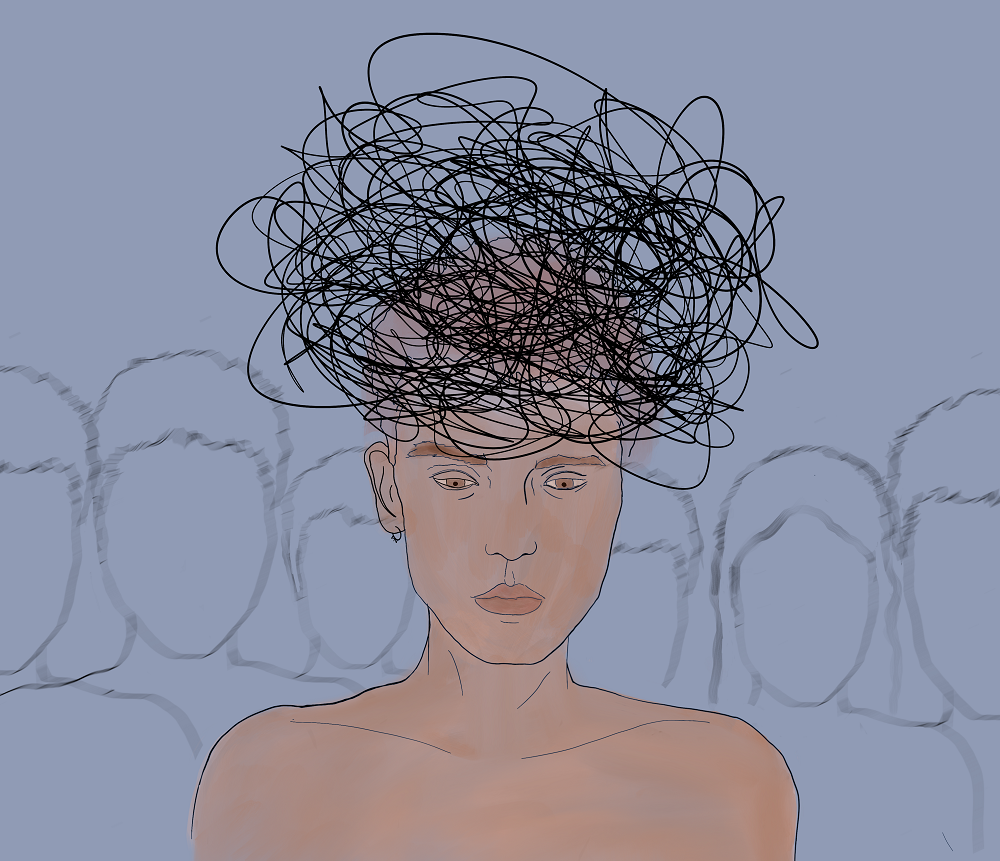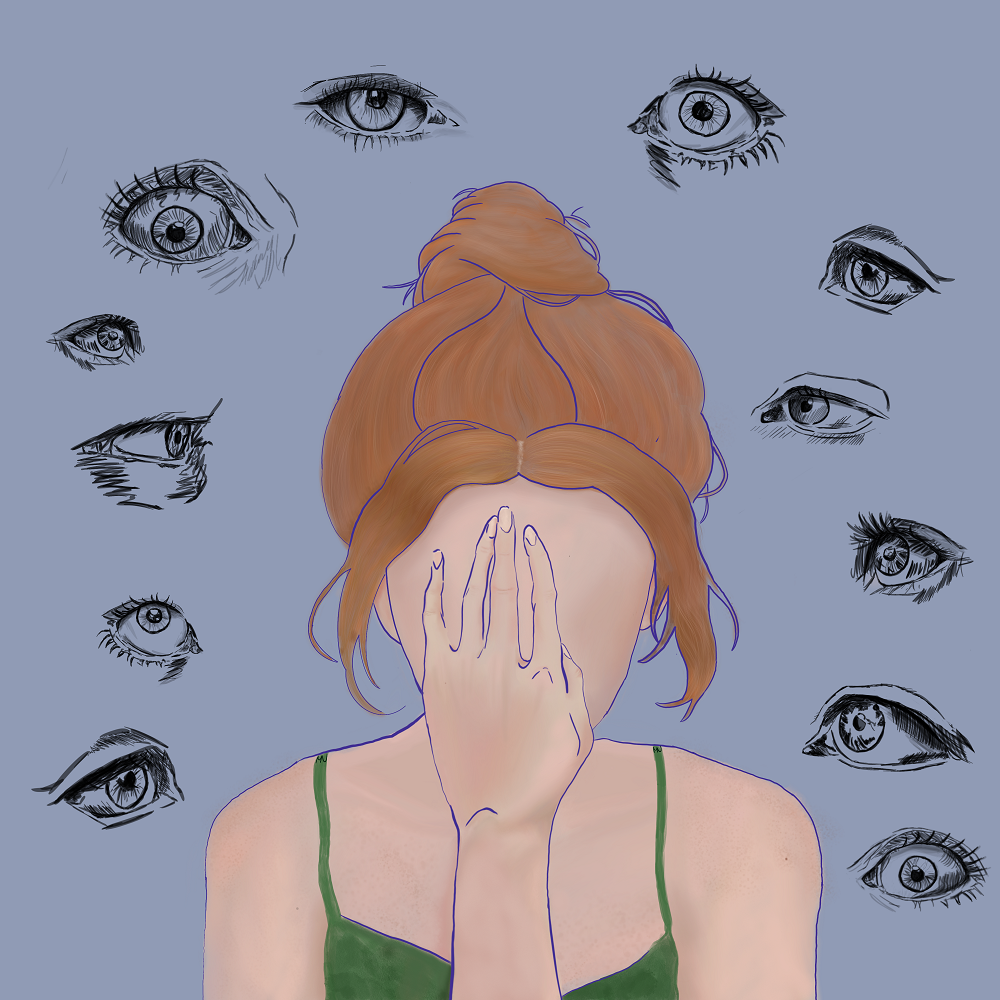Palpitations, dry mouth, tense posture: the students Theresa and Judith are too familiar with the feeling of social anxiety. What some might only know through memes from the internet is a restricting reality for others.
Theresa is a 20-year-old student. She has difficulties talking on the phone, opening the door for the postman, ordering food, visiting the doctor, introducing herself in large groups or talking to strangers. Even sending official emails to teaching staff or messages to people she is not close to, she feels a certain nervousness.
Our fear of being excluded from groups is an evolutionary trait, since humans have always depended on relationships with each other. The fear of rejection which goes hand in hand with our need for attachment has developed into a fear of evaluation in many people due to the development of an achievement-oriented society. It is less about the fear of social situations per se, but more about the limiting fear of embarrassing oneself in front of others and being rejected by them.
Social anxiety should be understood as a spectrum and ranges from mild limitations to extremely disabling fears. Shyness, introversion or social deficits are often mistaken for social anxiety, as the transitions are difficult to determine. Likewise, it cannot be ruled out that extraverted people suffer from social anxiety, too.
The 21-year-old student Judith says about herself: “When people know me well, I am extraverted, but when they don’t know me, I seem very introverted.” She would like to join in more often instead of having to hide all the time. At job interviews in groups, she always seems really shy and completely different from what she actually is without the fear.
What is social anxiety?
Psychologists distinguish between generalized and specific social anxieties. Generalized social anxiety relates to many social situations and is usually referred to as ‘social anxiety disorder’. Specific social fears, for example, the dread to talk in front of others, can also be captured by the term “social phobia”.

The psychotherapist Hans Morschitzky writes in his book “Angststörungen”: “If you have a specific social phobia, you can indeed get away with avoiding behavior more often without risking too much disadvantage.” Meanwhile, in generalized forms, the very ability to socialise is impaired. Some people show symptoms in all social situations and others only in certain ones.
“The disorder occurs more often in younger people. Social phobia is the third most prevalent mental disorder after depression and alcohol problems and the most common anxiety disorder,” writes Morschitzky.
“I would compare it to a stressful situation where I feel restless and extremely agitated inside,” says Theresa. In extreme cases, for example when she could not prepare for the social interaction, as in some seminars, where students are called on at random, her heart races. “My mouth gets dry, I sweat and I feel like my head is getting hot,” describes Theresa. Sometimes she also starts to tense up and speak with a trembling voice.
Judith can tell a similar story of feeling extremely uncomfortable being the centre of attention in groups in which she doesn’t know all of the people. “That’s why I almost always stay out of discussions and conversations in online classes — although I often have something to contribute,” says Judith. Her anxiety occurs especially during presentations in front of fellow students or when she can’t adjust to being the centre of attention. “Even when I meet my family or friends after a long time, I sometimes feel nervous,” she says.
Performance and interaction situations in which one’s behaviour can be observed and evaluated can be extremely challenging for socially anxious people.
Effects of online classes
The pandemic alone has created new reasons to avoid social situations. The thought of getting a coughing fit in a packed train, for example, can be reason enough to limit oneself. The online university, through which students are now studying in their third semester this summer, offers opportunities for retreat.

“I have the feeling that my discomfort in social situations has increased since the start of the online university,” says Theresa. Now that she is no longer forced to meet strangers on campus and in lectures on a daily basis, situations which might not have evoked nervousness before are triggering a certain uneasiness in her. Since sending emails and chat messages had already scared her a little even before the pandemic, she no longer gets involved in class. She prefers to work through the lecture material on her own, without keeping in touch with anyone. “I even thought about no longer going to my only seminar, because people are regularly called up there at random,” says Theresa.
However, digital learning formats also offer opportunities for peolpe affected by social anxiety. It can be easier to get involved in a class through the chat function or the microphone. This way, people participate in seminars and lectures who would utter few to no words in the lecture hall or seminar room.
“Avoiding situations leads to the perpetuation of fears.”
Theresa says about herself: “I just avoid the situations that might make me uncomfortable. I have come to terms with the fact that I won’t be able to participate in some situations because of this.” She doesn’t really feel excluded, though.
However, she does feel like she is limiting herself because of the fear. Theresa says she envies people who can just make a phone call or ask for help at the supermarket without thinking. “I think sometimes everything would be easier if I didn’t worry so much all the time.”
Mareike Thomas, a member of the Clinical Psychology Department at MLU and a psychotherapist in training, recommends instead of avoiding social situations — which is of course easier and more pleasant — to practice speaking freely during phone calls, seminars or other dreaded scenarios.
“Avoiding situations leads to the perpetuation of fears,” Thomas reports from her practice as a therapist. Currently, for example, you can meet with a few fellow students on Zoom, practise presenting and then ask how the others have actually perceived you. Often there is a distorted self-image, in the sense that you look terrible or are going to turn red. “I have had the experience of people catastrophising how they look to others and in all cases it was not as bad as they feared.”
Thomas explains social phobics tend to focus too much on themselves. “I know from experience many people are afraid of getting a shaky voice or having their hands shake because they are so excited.” Furthermore, socially anxious people often misinterpret neutral or ambiguous stimuli, such as an averted gaze, and attribute supposedly negative reactions to their own performance. Asking others what they think of the situation can be very helpful, because you often come across differently to others than you think. Thomas also recommends being aware of one’s own safety behaviour, such as gripping a glass because you are afraid your hands might shake.
Confrontation is therefore the method of choice. If the fear persists over a long period of time, does not diminish despite efforts and significantly restricts everyday life, it is advisable to seek professional help. Thomas advises seeking therapy if one experiences a high level of suffering and impairment in daily life.
Our university offers various services:
- psychosocial counselling service of the student services organisation: https://www.studentenwerk-halle.de/en/counseling-services/psychosoziale-beratung/psychological-counseling-services
- University outpatient clinic for psychotherapy: https://www.psych.uni-halle.de/abteilungen/hochschulambulanz/?lang=en
- IPP Training Institute for Behaviour Therapy Halle: https://www.ipp-halle.de/patienteninformation/
